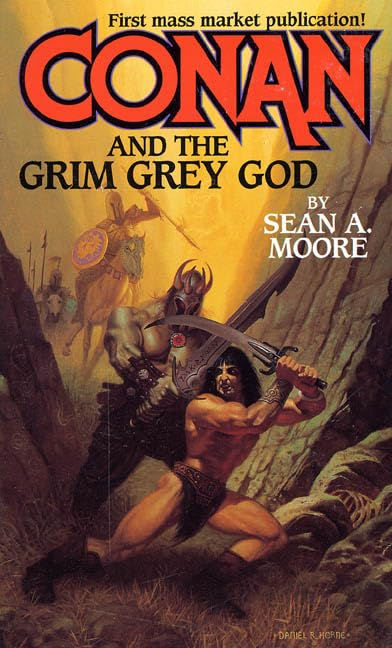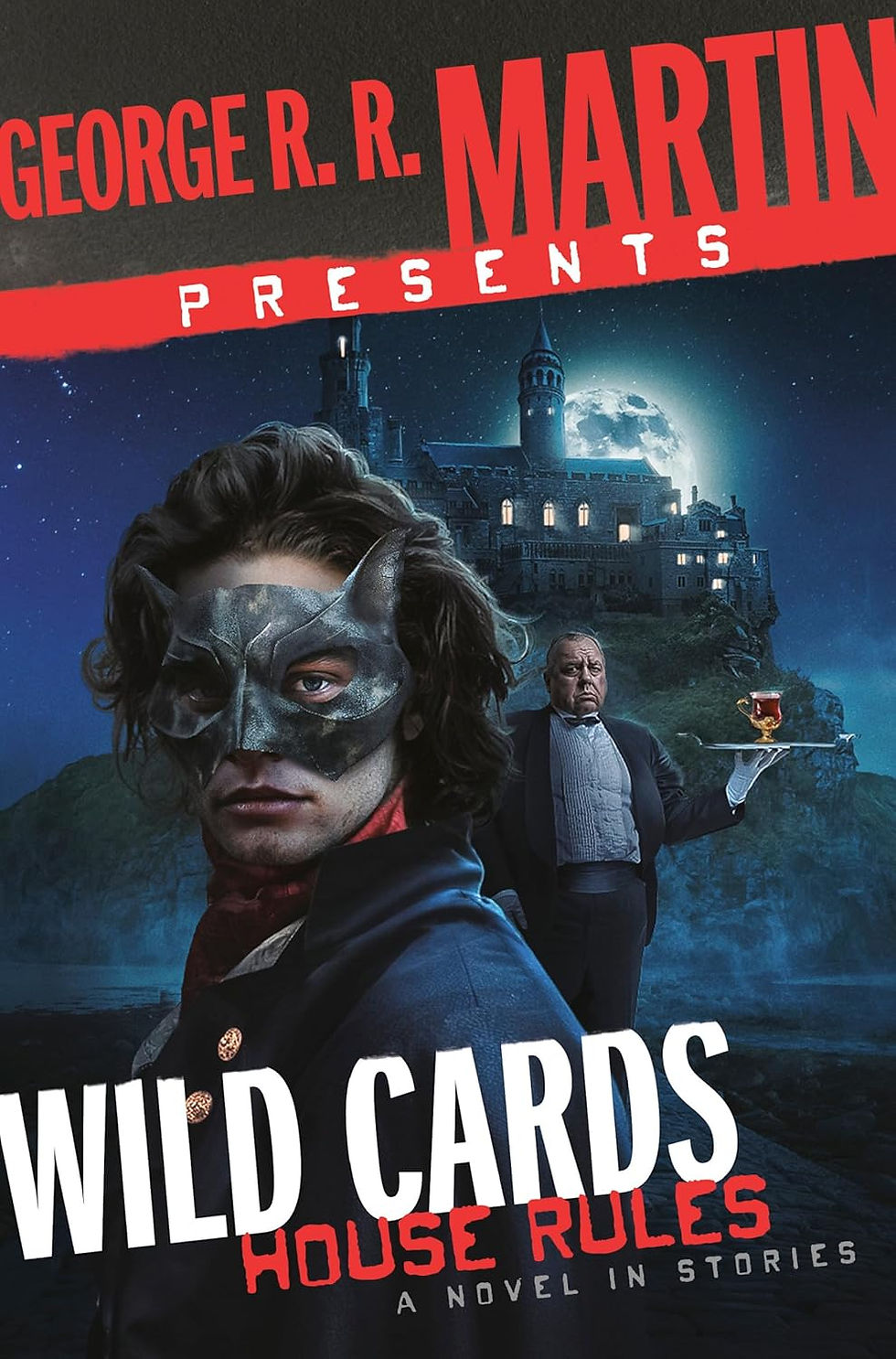Conan and the Bridge Too Far
- Greg O'Driscoll
- Feb 18, 2023
- 5 min read
Updated: Apr 11, 2023
CONAN - THE SWORD OF SKELOS

by Andrew Offutt
The next entry in our review of the non-Howard Conans is Andrew Offutt's Sword of Skelos. A better title might have been Swords of Skelos as there were two of them, but we'll get to that. First, a quick note about the author is in order; a surprising tidbit for some, the elephant in the room for those that already know.
Under numerous pseudonyms, Offutt wrote hundreds of "erotic" fiction novels in addition to the many sci-fi and fantasy novels under his own name, and it shows. Just as Conan and the Spider God by De Camp (or possibly even De Camp's wife as some have suggested) has a romantic flare more akin to Edgar Rice Burroughs, The Sword of Skelos has a very sexual component more akin to John Norman's Gor, though not as explicit or omnipresent. However, it is there, just beneath the surface, permeating the entire work.
It is an interesting comparison, because Offutt's Sword of Skelos and De Camp's Spider God are both tales of Conan's youth, but under each author a different aspect of Conan's near-mythical character is highlighted. De Camp gives us a softer, less jaded young Conan. Offutt gives us a crafty and cocksure young Conan still learning the ways of the world, but already a dangerous force to be reckoned with.
The plot centers around who shall claim a talisman called the Eye of Erlik: Akter Khan the ruler of Zamboula-- or other parties who somewhat justifiably wish him harm. Conan is in possession of the talisman from the get-go, and plays a cagey game of shifting alliances, working with whomever to whatever end seems best for him at the time. There's a bit of Maltese Falcon-style trickery going on as to where and how the Eye of Erlik has been hidden, but most readers should have it figured out by early on in the story.
This works because, despite the pre-Cataclysmic fantasy setting, Sword of Skelos is a noirish tale. Few to none of the characters, except possibly the desert-dwelling Shanki nomads (whom Conan grows to respect), have pure motives or will hesitate to betray anyone else. Yet even the Shanki are barbarously cruel to the female captives of a rival tribe, so no one is without stain in this tale of double- and triple-crosses. Conan is our prehistoric hired gun (sword, but you get what I'm saying) who tries to play fair and comes out on top after discovering everyone is corrupt to one degree or another.
The titular Sword of Skelos is the magical creation of Akter Khan's court wizard, Zafra, an ambitious young mage with dreams of empire and a fondness for Akter's favorite concubine, one of two femme fatale types in this sword and sorcery noir. When commanded to "slay him", the blades so enchanted by Zafra will soar through the air like a living thing to pierce the heart of either man or woman. Zafra creates two such weapons, one for himself and one for his khan, which is why Swords of Skelos might have been a better title, except that it doesn't matter in the long run. The swords are ultimately incidental.
Evading the attack of one magical sword creates an interesting challenge for the Cimmerian, but neither blade truly drives the story. They affect one or two key moments, including a timely betrayal in this book of betrayals and reversals, and nothing more. There is also a rebellion subplot that begins a little late in the game. It feels slightly tacked on, until the final chapter where things don't play out in the usual manner due to one last reversal of allegiance, so Offutt deserves some credit for that.
The story begins in media res. One wonders if Offutt had originally planned a longer book. By the time things get started, Conan has already obtained the Eye of Erlik, confronted the dreaded Sand Lich, slain the wizard who briefly stole his soul, and earned the enmity of Isparana, this sword-noir's other femme fatale. Even with this back story, nothing ever feels rushed or incomplete. Isparana is what concerns us anyway.
Swordswoman, thief, and former prostitute (though this last occupation feels as tacked on as the rebellion and without any clever pay off), risen from wretched poverty of Zamboula's slums, Isparana is Conan's rival and sometimes reluctant ally. She is the obligatory romantic interest for the barbarian and a good match. Unfortunately, she is literally used quite roughly, and some passages late in the book have not aged well-- and might have stank even back in the day.
I'm far from easily triggered and have a certain sneaking fondness for exploitative genre material, but even I have to raise an eyebrow at some things.
Conan and Isparana's animosity is blended with a mutual attraction? Fine. After a bloody battle, Conan bears her to the ground and her struggles give way to pleasure? Well, this is a male power fantasy set in a more primitive age. So we'll set aside the sexual encounter between Isparana and Conan, which the author (through Conan) later clarifies for us (and her) was "not rape."
What gets me is the passage following Conan's rescue of Isparana from Akter Khan's torturer, Baltaj:
" "I cannot tell you... how sorry I am that you gave this pig Baltaj so swift a death! They have done a lot more than merely use me, you know!" Conan nodded. "Merely" being "used," he knew, would have been far more to another woman, or the girl Isparana was not. Perhaps she had contrived to gain some enjoyment of it; he hoped so. He was glad he was male, and never had to make such a statement about "merely" being used."
Wow.
I can accept Conan's attitude reflecting the then-current belief (Sword of Skelos was first published in 1979) that rape was something that didn't happen to men. I can accept that, hardened by a life on the streets and with much blood on her own hands, Isparana is a warrior and therefor not as easily affected as other women by the emotionally shattering experience of rape.
The idea that she somehow enjoyed it? That's a bridge too far for me, Offutt.
Conan is still a young man in this tale, and correspondingly self-interested and callous, which is the only way I can rationalize this misstep, especially for a character with an often mentioned (though such a mention is absent in this story) "barbarous code of chivalry". It is hard to imagine King Conan rescuing Queen Zenobia from a wizard's altar, discovering she was "used", and hoping she found some way to enjoy it.
Other than that, Offutt does a good job. His prose never quite rises to the grim poetry of Robert E. Howard, but the characterizations (aside from my complaint above) are strong, the fights gory, and he builds suitable tension in the final scenes. Overall, Offutt is a long step above De Camp (or his wife). If you've exhausted the original Conan paperbacks, give this one a go.
Also Marvel Comics did an fairly faithful adaptation of this one in Savage Sword of Conan. The backstory with the soul-stealing wizard, Conan and Isparana's escape from slavery, and the Sand-Lich is expanded upon there. Eleven year old me was also quite delighted with some rather tame nudity courtesy of Isparana bathing in an oasis, skillfully depicted by John Buscema and Tony De Zuniga's beautiful art.

UPDATE: The things you find when you go plundering through your books! While looking for the next paperback to review I discovered Offutt's Conan and the Sorcerer! This is the backstory involving the soul-stealing wizard and the Sand Lich referred to by Conan in Sword of Skelos.
I had originally intended to take a break from Conan related stuff to review another author/genre, but I might have to do this one next!



Comments